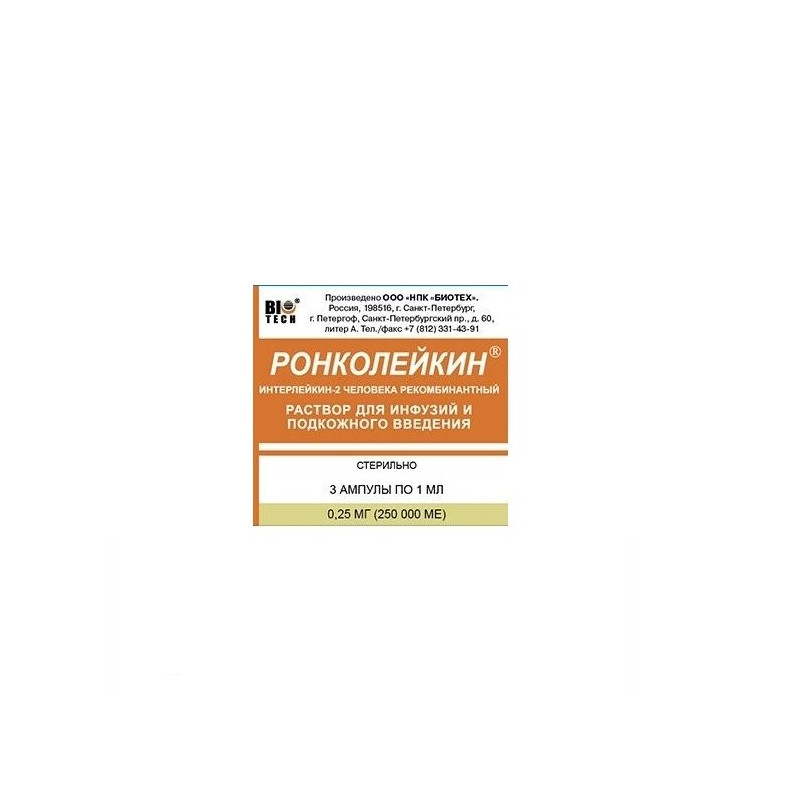



 All payments are encrypted via SSL
All payments are encrypted via SSL
 Full Refund if you haven't received your order
Full Refund if you haven't received your order
1 ml solution for infusion and subcutaneous injection contains:
Sodium lauryl sulfate 2.5 mg, mannitol 12 mg, dithiotreitol 0.08 mg, ammonium bicarbonate 0.79 mg, water for injection to 1 ml.
In 1 ampoule 1 ml of solution. In the package 3 ampoules.
Interleukin-2 (IL-2) is produced by a subpopulation of T-lymphocytes (T-helpers I) in response to antigenic stimulation. Synthesized IL-2 affects T-lymphocytes, enhancing their proliferation and the subsequent synthesis of IL-2.
The biological effects of IL-2 are mediated by its binding to specific receptors present on various cellular targets.
IL-2 directionally affects the growth, differentiation and activation of T- and B-lymphocytes, monocytes, macrophages, oligodendroglial cells, Langerhans cells. The development of the cytolytic activity of natural killer cells and cytotoxic T-lymphocytes depends on its presence. IL-2 induces the formation of lymphokine-activated killer cells and activates tumor-infiltrating cells.
Expansion of the spectrum of the lytic effect of effector cells causes the elimination of a variety of pathogenic microorganisms, infected and malignant cells, which provides immune protection against tumor cells, as well as pathogens of viral, bacterial and fungal infections.
The drug is contraindicated in pregnancy.
Carefully:
The appearance of a short chill.
An increase in body temperature during the administration of Roncoleukin, which is stopped by conventional therapeutic agents, is not a reason to interrupt the administration of the drug, as well as the course of treatment.
There were local reactions - pain, induration, redness at the injection site.
Treatment with Roncoleukin can be combined with treatment with all other drugs.
With the use of Roncoleukin on the background of long-term therapy with glucocorticosteroids, the activity of the drug may decrease.
Roncoleukin should not be mixed with other drugs in the same syringe or vial.
For intravenous administration, the drug from the ampoule is transferred to 400 ml of isotonic sodium chloride solution for injection. Infusion of the total volume of the solution is carried out drip for 4-6 hours.
The solution of the drug should be clear, colorless and free of impurities.
Immunotherapy with Ronnoleukin is carried out after the completion of urgent and urgent surgical interventions aimed at eliminating the life-threatening consequences of the underlying disease / injury, rehabilitation and adequate drainage of the infectious focus.
Conduct from one to three courses of Roncoleukin. The course includes 2 intravenous infusions at a dose of 0.5 mg.
The criterion for the appointment of the second and third courses of Roncoleukin is continued lymphopenia (absolute and / or relative) during treatment.
3 intravenous infusion of Roncoleukin at a dose of 0.5 mg with an interval of 48 hours on the background of specific polychemotherapy.
With unilateral PCT - 3 in / in the introduction of Roncoleukin no 1 mg with an interval of 48 hours.
In case of widespread PCT of the lungs with bilateral focal dissemination - 7 intravenous infusions of Roncoleukin: 3 injections during the first week, 1 mg with an interval of 48 hours, then 1 mg 2 times a week for two weeks.
The recommended course of immunotherapy should be completed 7-10 days before surgery.
Appointment of Roncoleukin with pulmonary tuberculosis is impractical with a body mass deficit of more than 30%.
A single sc or a / in the introduction of the drug in a dose of 0.5 mg 24 hours before surgery.
As part of an 8-week course of immunochemotherapy, 2.0 mg IV, every other day during the first four weeks of treatment.
Repeated courses are carried out in 1-2 months.
The drug is diluted in isotonic sodium chloride solution for injection. A single dose of the drug and the volume of isotonic solution in children depends on age:
For ease of use it is also possible to use: Roncoleukin solution for i / v and subcutaneous administration. 500,000 IU amp. [with a knife. amp.] pack. cardboard. 5 Biotech.
Special studies of the effect of the drug on the ability to drive and use complex equipment have not been conducted. If undesirable reactions develop on the part of the organ of vision and / or reduce the ability to concentrate and respond quickly, it is recommended that patients refrain from driving or working with complex equipment until these adverse reactions are resolved.
